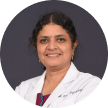Consultants

Dr. Rama Rajagopal
Senior Consultant

Chennai

Dr. Meena Lakshmipathy
Senior Consultant

Chennai
The C J Shah Cornea Services at Sankara Nethralaya, established in 1978 is a centre dedicated to the management of corneal disorders. The department consists of 15 well-trained corneal surgeons including Chennai and Kolkata. The departments are well equipped with instrumentation and technology to provide state-of-the-art care for patients suffering from a wide variety of corneal disorders. The departments have an elaborate academic and surgical training programme for fellows in cornea and external eye diseases. Research programme encompasses both basic and clinical work involving corneal diseases and transplantation. In a year in Chennai branch, about 45,000-50,000 outpatients are seen and about 3,500 surgeries are performed in the Chennai center. A total of 1200-1300 refractive surgeries and 650-700 corneal transplants are done each year.

Senior Consultant

Chennai

Senior Consultant

Chennai
The department caters to the efficient diagnosis and management of a wide range of diseases:
1. Corneal Topography
(PENTACAM,TMS-4,TOPOLYZER,CORVIS) - Evaluates shape and power of the corneal surface. The Pentacam, based on the Schiempflug photography is unique in that it provides invaluable information that other instruments are incapable of measuring.
2. Confocal Microscopy
Live microscopic imaging of corneal disorders
3. Pachymetry
Measurement of corneal thickness using ultrasound
4. Aberrometry
( I-Trace Aberrometer, Allegro Analyser) Measures the optical aberrations of the eye
5. Specular Microscopy
Study of the corneal endothelium (cells that maintain corneal clarity)
6. Anterior – Segment OCT
(MS 39/ Casia)Helps identify depth of density of corneal / conjunctival lesions, corneal thickness, anterior chamber details
7. Keratograph
Invaluable tool in dry eye work up
8. Tear Osmolarity
Measures tear osmolarity helping detect dry eye
9. Meibography and Lipiview
10. Anterior segment digital photography
Photographic documentation of various corneal conditions for baseline documentation, and monitoring effects of therapy as well as to monitor progression of the disease in any ectatic disorder.
11. Immunohistopathlogicial diagnosis of various immune disorders
The department offers most recent advances in the field of corneal surgery which include:
Penetrating Keratoplasty (PK):
Optical, tectonic and therapeutic with anterior segment reconstruction, combined with SFIOL, Vitreo-retinal procedures and Paediatric PK
Lamellar corneal surgeries:
Including Automated Lamellar Therapeutic Keratoplasty (ALTK), Deep Anterior Lamellar Keratoplasty (DALK), Descemet's Stripping EndoKeratoplasty (DSEK) and Descemet’s Membrane Endothelial Keratoplasty (DMEK)
Pterygium surgery
Corneal Tattooing
Management of wide range of ocular surface tumors leisons both benign nad malignant including surgery and chemotheraphy
Comprehensive management of SJS/ chemical injuries /ocular allergies/ ocular surface disorders
The Ocular Surface Clinic, one of the first of its kind in the country, caters to a wide variety of surface disorders including dry eye, ocular allergies, chemical injuries and Stevens Johnson syndrome. Started in 2005, the clinic offers comprehensive care and makes available the entire spectrum of treatment modalities for ocular surface disorders under one roof. It is the only centre in the world which performs all kinds of keratoprosthesis (artificial cornea) surgeries. 350 Keratoprosthesis surgeries have been performed so far.
1. Amniotic membrane transplantation
2. Recurrent Pterygium surgeries
3. Stem cell transplantation
4. limbal autografts and allografts
5. Mucous membrane grafting
6. Artificial cornea (Keratoprosthesis)